What to Feed Eclectus Parrots: Essential Dietary Guide

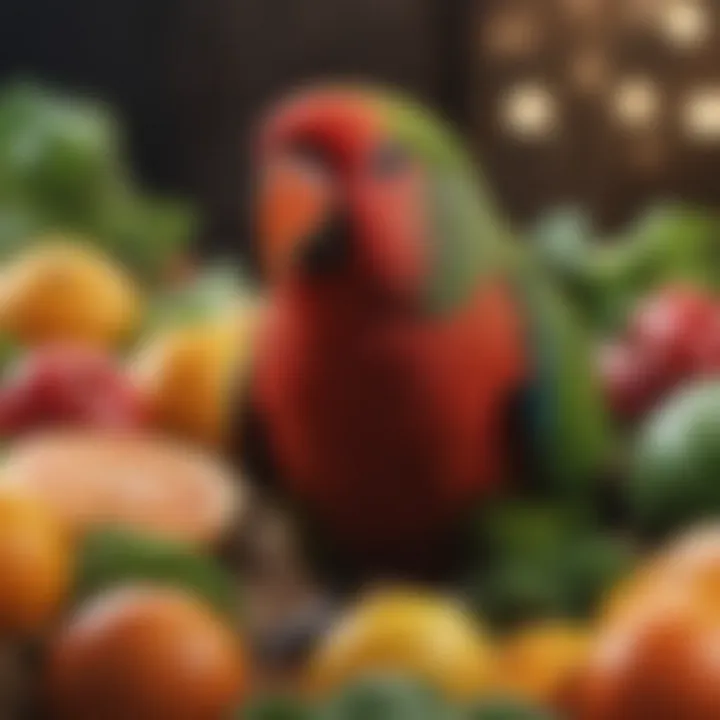
Intro
Understanding the dietary requirements of eclectus parrots is critical for their overall health. Unlike many other parrot species, eclectus parrots require a specific balance of nutrients. This diet not only influences their physical well-being but also affects their behavior and longevity.
In this guide, we will explore several key areas surrounding the feeding habits of eclectus parrots. From understanding what constitutes healthy food choices to practical feeding guidelines, each section aims to provide valuable insights for pet owners. This comprehensive discussion emphasizes the unique needs of eclectus parrots, ensuring they thrive in a home environment.
Understanding Your Pet
Pet Behavior Basics
Eclectus parrots exhibit charming and sometimes unique behaviors shaped by their natural habitat and diet. They are known for their quieter demeanor compared to other parrot species. Their calm nature can make them excellent companions in many households. However, their nutritional needs can greatly influence their behavior, affecting everything from their vocalizations to interactions with family members.
Common Breed Characteristics
The eclectus parrot is notable for its sexual dimorphism. Males are predominantly green, while females display more vibrant colors with red and purple accents. This distinction not only serves aesthetic purposes but also affects their social behavior and breeding habits. Understanding these characteristics can aid in providing a more tailored care approach.
Species-Specific Needs
When caring for an eclectus parrot, it is essential to cater to their specific dietary needs. They thrive on a diet rich in fruits, vegetables, and specific sources of protein. Unlike some other parrots, eclectus have a different digestive system. They require a higher intake of certain nutrients such as beta-carotene, which aids in their health and vibrant feathering.
Eclectus parrots require specific food types, different from other parrot species, to maintain optimal health.
Pet Care and Maintenance
Feeding Guidelines
To ensure your eclectus parrot enjoys a balanced diet, observe the following feeding guidelines:
- Fresh Fruits and Vegetables: Offer a variety of items such as carrots, peppers, apples, and leafy greens.
- Pellets: Use species-specific pellets designed for eclectus parrots as a staple in their diet.
- Protein Sources: Incorporate small amounts of nuts or cooked legumes to meet their protein needs.
This combination supports their digestive system and helps maintain their vibrant plumage.
Grooming Essentials
Maintaining the hygiene of your eclectus parrot involves regular grooming. Their beaks and toes need checking to prevent any growth issues. Bathing them occasionally also aids in keeping their feathers healthy.
Hygiene Practices
Keeping the environment clean will reduce the risk of infections. Clean food and water bowls daily, and replace soiled bedding frequently. Adhering to these practices not only ensures a hygienic living space but also plays a role in the bird’s emotional health.
Training and Development
Basic Commands and Skills
Training represents a crucial aspect of developing a bond with your eclectus parrot. Basic commands, such as “step up” or “come here,” should be introduced early. Using positive reinforcement, like small treats or praise, can encourage learning.
Behavioral Training Techniques
Utilize techniques that align with their natural instincts. For example, allowing them interaction with toys can foster mental stimulation. This can help in curbing negative behaviors that arise from boredom.
Addressing Common Behavior Issues
Behavior issues, like excessive squawking or biting, can often be mitigated through proper diet and socialization. If such problems arise, evaluating their diet can provide insights regarding their behavior.
Health and Wellness
Routine Vet Check-ups
Regular veterinary check-ups play a pivotal role in maintaining the health of an eclectus parrot. It's advisable to find a vet who specializes in avian care.
Vaccination Needs
Additionally, ensure that proper vaccinations are administered as recommended by the vet. These measures provide substantial protection against common avian diseases.
Recognizing Signs of Illness
Knowing the signs of illness is crucial. Symptoms like a change in appetite, lethargy, or feather plucking should prompt immediate attention. An informed owner can act swiftly to address health concerns.
Enrichment and Activities
Indoor vs.
Outdoor Activities
Eclectus parrots enjoy various activities. Indoors, fascinating toys that encourage problem-solving can be beneficial. Outdoors, supervised time can offer them fresh air and natural sunlight, vital for their well-being.
Interactive Toys and Games
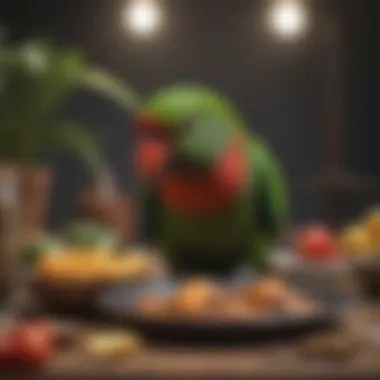
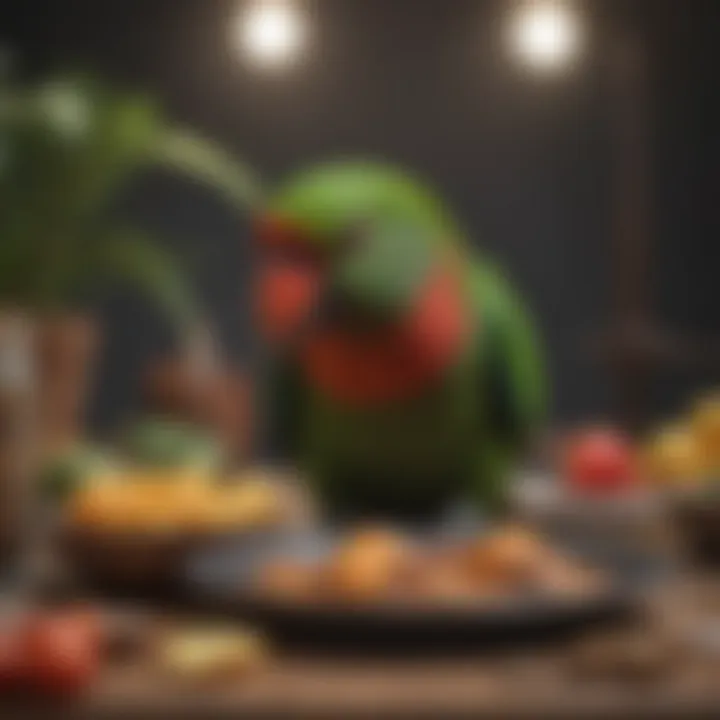
For enrichment, often provide toys that promote interaction and exercise. These can include swings, ladders, or puzzles that release treats.
Socialization Opportunities
Eclectus parrots thrive on social interaction. Engaging with them daily helps prevent loneliness and related behavioral issues. Consider integrating them into family activities whenever possible.
By understanding and following these guidelines, pet owners can ensure their eclectus parrots not only receive proper nutrition but also enjoy a fulfilling life in a loving environment.
Intro to Eclectus Parrots
Understanding the essential aspects of eclectus parrots is crucial for ensuring their health and well-being. This section lays the groundwork for comprehending their unique dietary requirements, which differ from many other parrot species. It is essential to be informed about these distinctions as they directly influence how pet owners should approach feeding their eclectus parrots.
Species Overview
Eclectus parrots belong to the family Psittacidae and are known for their vibrant plumage and distinctive sexual dimorphism. Males are predominantly green with bright orange and blue accents, while females display a striking red and purple blend. These parrots are native to the rainforests of the Solomon Islands, New Guinea, and surrounding areas. Their natural habitat plays a significant role in shaping their dietary needs. In the wild, they thrive on a variety of fruits, nuts, seeds, and flowers, which provide them with essential nutrients. Understanding their natural habitat aids in replicating a suitable diet that meets their specific requirements.
Unique Nutritional Needs
Eclectus parrots have a unique metabolic system that influences their nutritional requirements. Unlike many other parrot species, they require a diet that is higher in fibrous content and lower in fat. Their unique digestive system can process certain fruits and vegetables efficiently, but they struggle with high-fat foods. A balanced diet that includes a mix of fresh fruits, vegetables, and quality pellets is essential for these parrots. Additionally, offerings rich in vitamin A and omega fatty acids are crucial for their overall health. Proper understanding of these needs helps pet owners maintain a healthy and happy eclectus parrot.
Proper diet is crucial for eclectus parrots, as it impacts their overall health and life expectancy.
Understanding the Diet of Eclectus Parrots
Understanding the diet of eclectus parrots is crucial for their overall health and vibrancy. Unlike many other birds, eclectus parrots have specific dietary needs that reflect their origins in the wild. This knowledge allows pet owners to replicate their natural diet as closely as possible, which can lead to better health outcomes. A thorough comprehension of their dietary components is essential to prevent nutritional deficiencies and support healthy growth.
Natural Diet in the Wild
In the wild, eclectus parrots predominantly feast on a varied and rich diet composed of fruits, vegetables, nuts, and seeds. They inhabit the tropical forests of the Solomon Islands, New Guinea, and parts of Australia, where food is abundant and diverse. Their natural foraging behaviors equip them to seek out nutrient-rich food sources throughout their environment. This wild diet is high in fiber and water content, which aids in digestion and hydration.
Emulating a similar diet in captivity can promote strong immune systems and vibrant plumage. By understanding what these birds consume in their native habitat, owners can mirror these components in their pets’ diets, promoting a sense of natural balance and well-being.
Common Dietary Components
Fruits
Fruits are a primary dietary component for eclectus parrots. They provide essential vitamins and carbohydrates. The high water content in fresh fruits also helps keep these birds hydrated, which is vital for their health. Common fruit choices include papaya, mango, and berries, which are all rich in nutrients.
A key characteristic of fruits is their sweetness, which can make them particularly appealing to parrots. However, it is important to serve fruits in moderation, as too much sugar can lead to obesity and other health issues. Diversity among fruit selections can prevent dietary boredom and ensure a range of vitamins.
Vegetables
Vegetables play a significant role in sustaining eclectus parrots. Dark leafy greens like kale and collard greens, along with carrots and peppers, provide essential minerals and vitamins. They are usually lower in sugar than fruits, offering a beneficial balance to the diet. Including a variety of vegetables ensures a well-rounded intake of nutrients.
One unique feature of vegetables is their fiber content, which supports digestive health. However, pet owners must ensure that fresh vegetables are free from pesticides, as these can be toxic to birds. Implementing a wide variety of vegetables is critical in preventing deficiencies and maintaining overall health.
Nuts and Seeds
Nuts and seeds serve as a source of fat and protein for eclectus parrots, albeit as treats rather than staples. Almonds, walnuts, and sunflower seeds can be included occasionally. These food items are energy-dense and may help maintain weight during periods of lower food intake.
A key characteristic of nuts and seeds is their high fat content. While they are nutritious, they should be offered in moderation to avoid obesity. It's also essential that nuts and seeds are unsalted and free of additives; otherwise, they can have adverse health effects.
In summary, the diet of eclectus parrots must be thoughtfully structured to mirror the variety and nutrition they would encounter in the wild. Understanding the impact of fruits, vegetables, and nuts will enable pet owners to support the health and longevity of their beloved birds.
Essential Food Types for Eclectus Parrots
Understanding the essential food types for eclectus parrots is crucial for ensuring their health and longevity. These birds have specific dietary needs that differ from other parrots, making it important to select the right types of food. Feeding eclectus parrots a balanced diet not only supports their physical health but also their emotional well-being. Providing varied food types also prevents boredom and encourages natural foraging behaviors.
Pellets: A Mainstay
Pellets are often seen as a fundamental part of an eclectus parrot's diet. They provide a well-rounded nutritional profile featuring key vitamins, minerals, and other nutrients. Choosing high-quality pellets ensures that your parrot will receive essential nourishment.
Choosing Quality Pellets
When selecting pellets, look for those specifically formulated for eclectus parrots. The ideal choice is one that contains high levels of fruits and vegetables, as these parrots thrive on natural flavors. A good brand will list whole ingredients rather than using fillers. If you read the label carefully, you will notice its important that the first few ingredients are fruits or vegetables. It is a popular choice because it simplifies feeding while addressing their unique nutritional needs. However, not all pellets are created equal, so be cautious of products that contain excessive sugars or artificial additives.
Serving Size Recommendations
Serving size is critical in establishing a proper diet for eclectus parrots. Typically, a daily serving of pellets should comprise about 60% of their diet. It is recommended to observe your bird to adjust the serving size based on its activity level and body condition. Over time, you will learn how much your parrot consumes at each feeding, allowing you to optimize portions. This helps ensure they get the right amount of nutrients while preventing obesity or underfeeding.
Fresh Fruits and Vegetables
Fresh fruits and vegetables play a vital role in the diet of eclectus parrots. They provide necessary hydration, vitamins, and minerals that are not found in pellets alone. Incorporating these foods ensures a balanced diet full of natural flavors.
Best Options for Nutritional Balance
Certain fruits and vegetables should be prioritized for a better nutritional balance. Leafy greens, such as kale and broccoli, are excellent sources of calcium, while bell peppers offer various vitamins, including Vitamin A. Fruits such as papaya and mango are also beneficial, providing essential nutrients and promoting hydration. Opting for organic produce can be an additional step towards ensuring a healthier diet. These options are popular because they mimic their natural diet. Make sure to wash fruits and vegetables thoroughly before serving to remove any pesticides.
Preparing Fruits and Vegetables
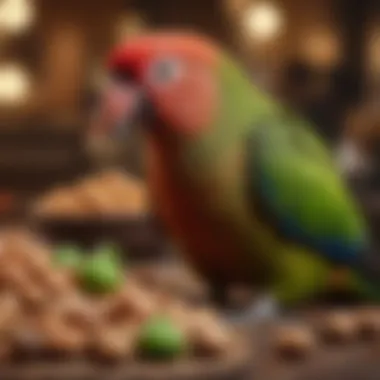
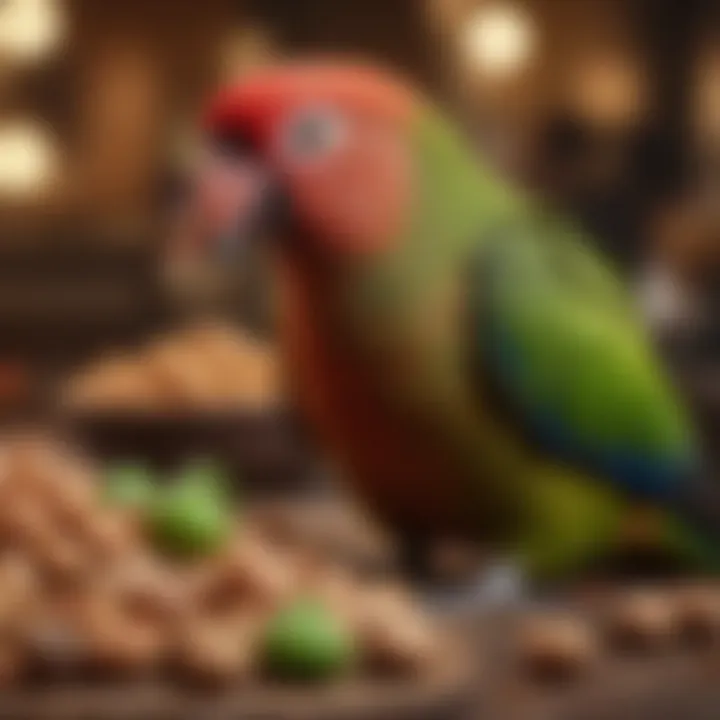
Proper preparation of fruits and vegetables is key to making them appealing to your eclectus parrots. Ensure they are cut into manageable sizes to prevent choking. Serving them fresh and raw is best, as cooking can remove vital nutrients. Introduce new items slowly to gauge your parrot's preference. Frequent changes in fruit and vegetable selection can keep their diet exciting and prevent repetitive feeding.
Nuts and Seeds: Treats vs.
Staples
Nuts and seeds can serve as tasty treats but should be carefully integrated into the overall diet. They have high-fat content and can lead to weight gain if overfed. Understanding their role is crucial.
Moderation and Frequency
Moderating the frequency of nut and seed offerings is essential. It is advisable to limit these foods to a small amount, about 10% of the daily diet. Offering them as treats during training can be beneficial without making them a staple. This balance prevents obesity, allowing your eclectus parrot to stay healthy while still enjoying their preferred foods.
Healthier Nut Options
When selecting nuts, consider healthier options such as almonds or walnuts. These nuts provide essential fatty acids while offering a range of nutrients. Avoid salted or flavored nuts, as preservatives or excess salt can be harmful. Selecting smaller amounts of higher quality options ensures your eclectus parrot enjoys treats that are both tasty and nutritious.
Remember, a diverse diet is key to a happy and healthy eclectus parrot. Always consult with a veterinarian if you are uncertain about dietary choices.
Foods to Avoid
Understanding what foods to avoid is crucial when it comes to feeding your eclectus parrot. Certain foods can cause serious health issues and even be toxic to these birds. Awareness of these potential hazards can help pet owners create a safe and nutritious environment for their parrots.
Toxic Foods for Eclectus Parrots
Avocado
Avocado is a common food that many pet owners might consider sharing with their birds. However, this fruit is exceptionally dangerous for eclectus parrots. The pit, skin, and flesh of the avocado contain a substance called persin. Persin is toxic to many species of birds, including eclectus parrots, and can lead to respiratory distress and heart problems. Its creamy texture and richness might seem appealing, but those traits contribute to its risk factor.
Caffeine
Caffeine tends to be a popular stimulant for humans, often found in coffee and tea. For eclectus parrots, consumption of caffeine can lead to severe consequences. This stimulant can cause increased heart rates, hyperactivity, and even lead to cardiac arrest in extreme cases. Only a small amount is needed to make a bird severely ill. While caffeine can provide excitement for people, for parrots, it only serves as a danger.
Chocolate
Chocolate is often seen as a delightful treat for people but poses a significant threat to eclectus parrots. It contains substances known as theobromine and caffeine, both of which are toxic to many animals, particularly birds. Consuming chocolate can lead to symptoms such as vomiting, diarrhea, increased heart rate, and, in severe cases, seizures or death. The appeal of chocolate for owners doesn’t benefit their pets. Instead, it’s a clear example of a food to be avoided.
Processed Foods and Their Risks
Processed foods are often filled with additives and preservatives that can be harmful to eclectus parrots. High levels of sodium and sugar found in processed items can lead to obesity and other health concerns. These foods may lack nutritional value and provide empty calories. Feeding them processed foods can lead to severe long-term health implications.
Considerations
- Be aware of what foods you introduce.
- Opt for whole, natural foods whenever possible.
By being cautious and informed, you can ensure the wellbeing and longevity of your eclectus parrot.
Feeding Techniques and Best Practices
Feeding techniques for eclectus parrots are essential for ensuring their health. The right practices can nourish your pet and promote their natural behaviors. In this section, we will dive into several key aspects of effective feeding strategies.
Establishing a Feeding Schedule
Creating a consistent feeding schedule is paramount in maintaining your eclectus parrot's health. Unlike other birds, these parrots thrive on regularity. A feeding routine helps regulate their digestion and can improve their overall behavior.
Benefits of a Structured Schedule
- Reduces stress for your pet.
- Mimics their natural feeding habits, which can lead to improved mental health.
- Allows you to monitor changes in appetite or behavior more clearly.
Consider dividing their food into two main meals per day. For example, feed your parrot in the morning and again in the evening. This approach can help you observe how much they eat and when they prefer to feed.
Monitoring Portion Sizes
Monitoring portion sizes is vital. Overfeeding can lead to obesity, while underfeeding can cause malnutrition. Eclectus parrots have specific dietary requirements, and understanding these can guide you in managing their intake.
Guidelines for Portion Control
- Use a kitchen scale: Weigh the food portions for accuracy.
- Visual assessment: Familiarize yourself with what a proper serving looks like for your bird.
- Adjust as needed: Be responsive to changes in your parrot’s weight or energy levels.
Utilize a combination of pellets, fresh fruits, and vegetables to ensure balanced nutrition. Make adjustments based on your parrot’s age, health, and activity level.
Encouraging Foraging Behaviors
Encouraging foraging behavior is crucial for your eclectus parrot's mental well-being. In the wild, these birds spend significant time searching for food. Providing opportunities for your pet to engage in natural foraging can reduce boredom and promote physical activity.
Ways to Promote Foraging
- Hide food in toys: Use puzzle toys or foraging devices to stimulate their curiosity.
- Scatter feeding: Place small amounts of food in different areas of the cage or play area.
- Natural branches: Attach snacks to branches or other safe surfaces, encouraging your bird to explore.
Implementing these techniques helps fulfill their instinctual needs. Such practices improve your eclectus parrot's quality of life, making feeding a more enriching experience.
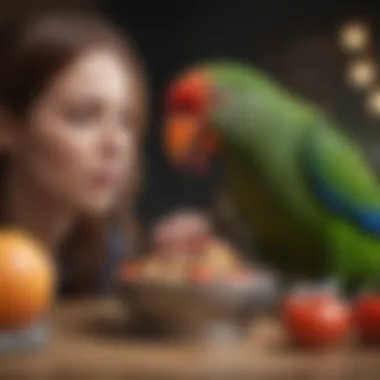
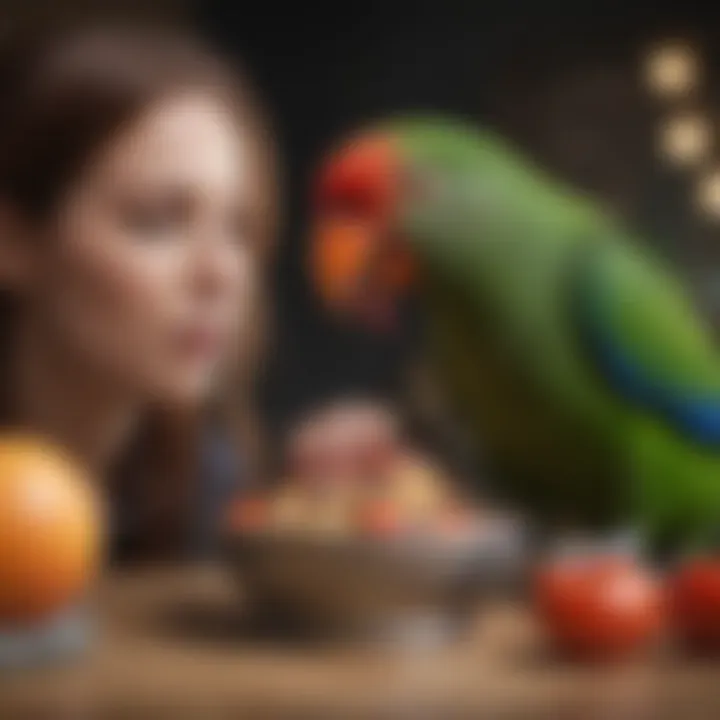
Proper feeding techniques can lead to happier, healthier birds. The right habits can foster long-term well-being in eclectus parrots.
Supplemental Nutrition
Supplemental nutrition plays a vital role in maintaining the health of eclectus parrots. Given their precise dietary needs, supplements can greatly enhance their overall well-being. Using supplements correctly can help bridge any nutritional gaps that may arise from a varied but potentially insufficient diet. It is important to choose supplements based on the specific requirements of these birds.
When and How to Use Supplements
Timing for supplement use is crucial. Supplements should not replace a balanced diet but rather complement it. It is advisable to introduce supplements gradually, observing the bird's response. For instance, during specific life stages, such as breeding or recovery from illness, the need for certain nutrients may increase. Consulting with an avian veterinarian can provide tailored advice.
Essential Vitamins and Minerals
Calcium
Calcium is critical for the health of eclectus parrots. It contributes to bone strength and is essential for muscle function. A calcium deficiency can lead to serious health issues, including metabolic bone disease. Its importance in maintaining strong bones makes it a necessary addition to their diet, particularly for breeding females, who have a heightened need for this mineral. However, over-supplementation can also be harmful, leading to renal issues.
Vitamin A
Vitamin A supports eye health and immune function, crucial for an eclectus parrot's general well-being. Deficiency can cause severe consequences like poor vision or susceptibility to infections. A beneficial aspect of Vitamin A is how it promotes skin health and feather maintenance. Including this vitamin in the diet ensures that the bird retains a vibrant plumage. However, excess amounts can lead to toxicity, so balancing intake is necessary.
Omega Fatty Acids
Omega fatty acids are important for promoting skin and feather health. They support heart health and contribute to a well-functioning immune system. A key characteristic of omega fatty acids is their anti-inflammatory properties, helping prevent some diseases. They can be found in sources like flaxseed oil or fish oil. When used appropriately, they can enhance the overall diet of an eclectus parrot. Nevertheless, it is essential to monitor the quantity given, as they are calorie-dense and can lead to obesity if overfed.
"A well-rounded diet, including the right supplements, is crucial for the vitality of eclectus parrots".
Hydration for Eclectus Parrots
Hydration plays a critical role in the overall health and wellbeing of Eclectus parrots. This section highlights key elements surrounding water intake that pet owners should not overlook. It is vital to recognize that, like any other living creature, these parrots require regular access to fresh water. Proper hydration aids in digestion, helps in maintaining body temperature, and supports many physiological functions necessary for a healthy life.
Importance of Fresh Water
Eclectus parrots thrive on a diet that is naturally rich in moisture. In the wild, they consume a variety of fruits and vegetables, which consist of high water content. Therefore, supplying fresh water is a fundamental aspect of their care at home. Water maintains hydrobalance in their bodies. Without adequate hydration, these parrots may experience dehydration, leading to serious health issues such as kidney problems or severe lethargy.
Fresh water encourages normal behavioral patterns in your parrot as well. It assists in the proper consumption of food. Many pet owners might overlook how a lack of water can impact their bird's appetite. Hence, providing fresh, clean water is essential not just for hydration, but also for allowing the bird to be its naturally active self.
Water Quality and Accessibility
When it comes to providing water for Eclectus parrots, the focus also needs to be on quality and accessibility. Water should be filtered to remove chlorine and other contaminants that could harm the bird. Tap water may contain additives that are not suitable for their health.
Place water containers in locations easily reached by the parrot. Regularly check the water to ensure it remains clean and fresh. Change the water at least once a day to avoid bacterial growth. Additionally, consider using multiple containers throughout the cage to give your parrot options and promote independent drinking behavior.
Providing clean and accessible water every day is just as important as a balanced diet for your Eclectus parrot.
Some suggestions include using ceramic bowls or stainless steel containers as they are easier to clean and maintain. Avoid using plastic containers, as they may leach chemicals into the water over time.
In summary, proper hydration for Eclectus parrots involves ensuring they have access to fresh and clean water daily. This not only supports their health but also their happiness and vitality.
Signs of Nutritional Deficiency
Nutritional deficiency can pose significant challenges for eclectus parrots. Recognizing signs of poor nutrition is essential for pet owners, as early intervention can prevent serious health issues. Understanding the symptoms can help ensure that your parrot thrives rather than merely survives.
Recognizing Symptoms
Feather Condition
Feather condition serves as a vital indicator of an eclectus parrot's nutritional health. Healthy feathers should be smooth and intact, while signs of deficiency often present as dullness or irregularity. For instance, if feathers are fluffed or look unkempt, it may point to inadequate vitamin intake, particularly vitamins A and E.
Maintaining optimal feather condition is advantageous; it reflects overall health and wellbeing. A parrot with vibrant feathers is typically more active and has a better immune response. Therefore, monitoring feather quality is key for pet owners invested in their bird’s health.
Behavioral Changes
Behavioral changes often reveal underlying nutritional deficiencies in eclectus parrots. A noticeable shift, such as increased aggression or decreased interest in interaction, may suggest imbalances in diet. These changes often stem from a lack of variety in nutrients or essential vitamins missing from their intake.
Understanding behavioral changes can help owners create a balanced diet that incorporates essential nutrients. Observing your parrot's activity levels and interactions offers insights into its mental and emotional health, both of which are influenced by diet.
When to Consult a Veterinarian
Recognizing persistent signs of nutritional deficiency is critical. If your parrot exhibits severe feather loss or drastic behavioral changes, it’s time to consult a veterinarian. A professional assessment can determine if the nutrition plan needs revising or if underlying health issues exist.
Epilogue
Summary of Dietary Needs
In summary, understanding the dietary needs of eclectus parrots is vital for their overall health and well-being. These birds require a balanced diet rich in various nutrients to thrive. A combination of high-quality pellets, fresh fruits, and vegetables should form the core of their diet. It is also important to monitor the proportions of each food type. This ensures that your eclectus parrot receives all essential vitamins and minerals while avoiding unnecessary weight gain.
A proper feeding regime helps to prevent nutritional deficiencies, which can lead to serious health problems. Providing a diverse range of food items allows the bird to explore tastes and encourages natural foraging behaviors. Therefore, balancing their diet not only supports their physical health but also contributes to their mental stimulation.
The Importance of Nutrition for Health and Longevity
Nutrition plays a significant role in the health and longevity of eclectus parrots. The right diet not only keeps them active but also strengthens their immune system. Birds with a balanced diet typically show better feather quality and maintain optimal body weight.
Moreover, a varied diet helps in avoiding common issues associated with birdkeeping, such as obesity or vitamin deficiencies. Proper nutrition can enhance their lifespan and improve their quality of life. Pet owners should prioritize high-nutrient foods, integrating fresh produce regularly.
Remember: An attention to dietary detail can make a profound difference in your eclectus parrot's health and happiness.







